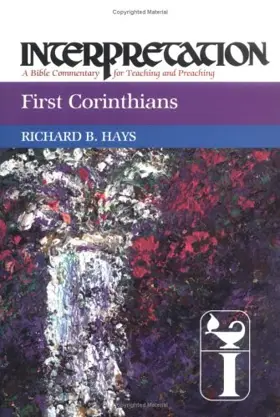

First Corinthians
Pages
299
Publisher
Westminster John Knox
Published
1/1/1997
ISBN-13
9780804231442
Collections
This book appears in the following featured collections.
- Commentaries I Would Not Do Without by R. Hansen
- Building an NT Commentary Library by Invitation to Biblical Interpretation (Kostenberger & Patterson)
- New Testament Commentaries & Monographs by Princeton Theological Seminary
- Nijay Gupta's Top NT Commentaries by Nijay K. Gupta
- Recommended New Testament Commentaries for Evangelical Pastors by Thomas R. Schreiner
Reviews
If you're looking for a Shorter Commentary about First Coronians, of course, I recommend Hays' book.
Beautifully written, this commentary provides insights and explanations with almost every sentence. I am using another commentary along with this one (as suggested by other reviewers.) But Hays' work is my favorite. Highly recommended for a layperson (like me.)
Hays is a world-renowned Pauline scholar who has written ground-breaking works in Paul’s interaction with the Old Testament as well as Paul’s moral reasoning. He has only written a couple of commentaries, so I consider these precious commodities. Hays’ work fits well with this series, offering interpretive, theological, and preaching pointers for pastors.
[Full Review]
Every commentary series has its hits and misses. Interpretation seems to have more misses than most from what I've read. I only own 6 of them, 4 of which are excellent. Hays' volume on 1 Cor. is one of those excellent volumes. In fact, I usually go to this volume first (alongside Thiselton for more detailed linguistic analysis). 1 Cor. tackles some "touchy subject matter" which requires a certain knack for wording things in a clear and concise way to speak the truth without being calloused and moralistic. Hays does that as well as any. This is a very readable commentary, accessible to well-read laity, but still detailed enough for folks with formal theological training to chew on.
This is a great commentary. Everything I wish in a commentary. Very readable and concise. Good exposition keeping in mind the larger context and themes. And especially really good interpretation / application in helping us think through its implications for today. For the pastor this would be my first choice.
Hays' commentary is hands-down the best in the Interpretation series. This is not a detailed work, but is a helpful guide to the broader theology of 1 Corinthians, as well as the use of the OT and even application ideas for preachers and teachers. His judgments won't always please the conservative evangelical, so you will want to use with discernment. Hays takes very seriously that Paul sees the Gentile Corinthians as part of Israel's story. Hays is also at his best in dealing with chapter 15 on the resurrection of the body. Because of the relative lack of exegetical detail, I don't think this commentary ought to be used on its own. I would supplement with at least one of Fee, Thiselton and Hays.
Hays adds his incredible eye for intertextuality to aid interpreters in seeing depth in Paul's arguments that extend from the OT. The text will leave exegetes wanting a bit, as it focuses extensively on theology and studies the text from pericope to pericope, but nevertheless I found the commentary extremely illuminating.
All commentary series are uneven in quality and the Interpretation series is no exception. Some of the commentaries in this series frankly have not merited serious review, but this is certainly not the case with Hays's contribution on 1 Corinthians. This volume stands out not merely because of its size and substance but also because of its quality. Here is a model of how to take seriously both horizons this series intends to discuss—the horizon of the text in its original historical context and the contemporary horizon, especially as it intersects with the church's tasks of preaching and teaching. The reader familiar with Hays's Echoes of Scripture in the Letters of Paul and The Moral Vision of the New Testament will find a satisfyingly full treatment of how the methods worked out in these earlier works can be applied across the length and breadth of an entire NT document. 1 Corinthians is read in light of both the Greek and Hebrew versions of the OT, without turning Paul's missive into nothing more than an echo chamber. Hays knows that an allusion to the Hebrew Scriptures does not lie under every rock in this letter. Hays is also eager to scrutinize closely the exegetical substance of this document to find its major themes, its narrative framework, and its eschatological orientation in order to make clear how time and again this material can be useful for modern teaching and preaching. It is instructive to consider to whom Hays acknowledges indebtedness in this work by the occasional citation. Of commentators, W. Schrage, C. K. Barrett, and G. D. Fee show up most often and are usually cited approvingly, and of specialists in the Corinthian corpus D. B. Martin, M. Mitchell, J. Murphy-O'Connor, W. Meeks, and B.
[Full Review]







